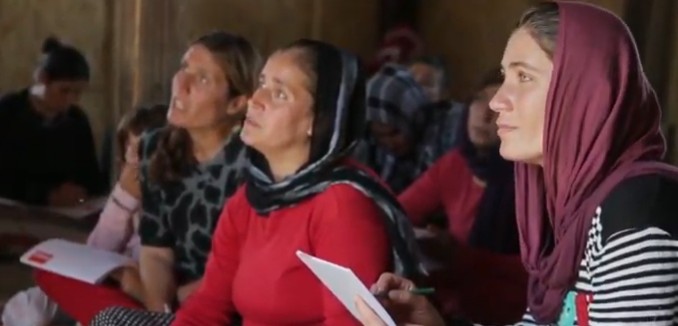With a strong Israeli and Jewish presence offering assistance to refugees from Syria and other war-torn nations on the Greek islands, one native of Aleppo asked, “How can I keep saying you are the enemy?” Ynet reported Monday.
Thousands of refugees from Syria, Iraq, Iran, Afghanistan, and other Middle Eastern countries have made their way to the Greek islands with hopes of eventually settling elsewhere in Europe. In 2015, more than a million refugees crossed the Mediterranean, often in rickety boats, with the hopes of reaching wealthier nations where they could be absorbed.
There are an estimated 60,000 Syrian refugees in Greece, 14,000 of whom live on the Greek islands.
H. is a 20-year-old native of Aleppo, who lives in a refugee camp on the island of Lesbos.
“My whole life, all through my childhood in Syrian schools, I was taught that the Israelis are the enemy, and then the first thing I see when I approach the Greek coast is the Star of David on the shirts of Israelis who reach out and place me on the ground,” H. recalled of his arrival at the island.
H., who was educated at an Israeli-run school along with refugees from Iraq and Afghanistan asked, “How can I keep saying that you are the enemy?”
The young Syrian now works as a teacher after studying at one the schools set up by Israeli organizations. He has received authorization to settle in Athens, a goal sought by other refugees.
“I was only exposed to Israelis through television; they told us that Israel is the enemy, but reality has revealed a different truth,” an Iraqi native, N., who works as a school coordinator, said. “That’s how it is in the Koran – we are cousins.”
Two Israeli organizations, IsraAID and Hashomer Hatzair, began working on Lesbos in 2015, when the main influx of refugees arrived.
Another Jewish organization, Mosaic United, which is attempting to encourage young Jews to “give back to their community” or Tikkun Olam, is also working in Greece. The Jewish Agency is working with Mosaic United. In addition, Rabby Benji Levi, CEO of the organization, says that the government of Israel will contribute $66 million to his organization, which amounts to one-third of its budget.
The Israelis, according to Ynet, “are the last organized body providing humanitarian aid on the island, alongside a solitary community center funded by the European Union and the Greek authorities.”
[Photo: IsraAID / YouTube ]




